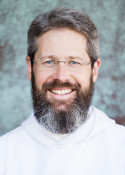FROM THE RECTOR
 author | ity
author | ity
This past week I joined the Rev. Alissa Newton to lead a retreat for clergy in the Diocese of Rochester in the Finger Lakes region of New York using tools from the College for Congregational Development. It was in conversation and data gathering with the clergy of that diocese, that the focus for our time together became clear––Leading in Times of Anxiety.
It was in the midst of our study of the Benedictine practices of Stability, Obedience, and Conversion of Life, that we spent some time with the concept of authority. What we found is that many of the priests that we were in conversation with were unsure about their use authority, and understandably repelled by the abuse of it.
There are many salient reasons for this wariness. Several of our standard definitions of authority are coercive in nature, as in, “the power to enforce obedience,” or, “the right to command or give an ultimate decision.” Abusive, dishonest, and destructive behavior by those with political, religious, military, and financial authority has broken many people’s trust in positional authority. Once understood as “legitimate” authority, the effects of these actions by people in positions with authority, especially in the later half of the 20th century, has brought to life a verse from Proverbs, “When the righteous are in authority the people rejoice; but when the wicked rule the people groan.” (Prov. 29:2)
And yet. Even with the many examples that we are surrounded with of those who use the power of their authority to diminish, ridicule, or deform others, this is not the only understanding of this concept. And I don’t believe that these actions are inherent within the use of authority.
Getting back to the Latin roots of the word, we find that the word breaks down to author and ity. And a basic understanding of those parts might be, “A state or condition (ity) that gives existence to something, makes it grow or increase (author).”
Or, an even simpler definition could be, “the power to create.”
Consider the author, who creates with words, or the wisdom of Rabbi Abraham Heschel, who reminds us that, “Words make worlds.” One with authority––whether they gain their power through relational, expert, positional, reward or coercive means––has the potential to create. And the ways that they shape the people and environment around them makes certain beliefs, possibilities, and even realities come into being. The issue, then, isn’t the existence of authority in and of itself, but instead the ways that it is used to influence.
As we recently heard in Mark’s Gospel, through his teaching, his actions, his presence, and his attention, Jesus is consistently experienced as one having authority. And part of what was so remarkable about his life was how, over and again, when tempted to use this authority for his own gain, he used the authority given him to create or make manifest, God’s Realm. From his re-ordering of how the disciples with hold power with one another, “whoever wishes to be great among you must be your servant” (Mk. 10:43), or his subversion of power by washing his students’ feet at the Last Supper (Jn 13), Jesus consistently uses his authority by serving those who have less of it.
Each of us, in ways small and large, has been given authority. This may be exercised in the context of our familial relationships, or through the direction we give employees, or in the rewards we give to those whom we favor.
The question about authority isn’t so much whether we will have it. The question is what we will increase, come into existence, or be given life when we use it.
Peace,
Phil+
From the Associate for Music
Singing, Praying, and…Math?
Next week we enter Lent, a time of year that can be used for trying out new spiritual practices, like joining our Choir and/or Angel Band! Music is a fun way into a community, and at All Souls we love to have enthusiastic singers on both sides of the table around which we gather each Sunday.
The prospect of parishioners treating group singing as a new spiritual practice and adding to the ranks of our resident ensembles prompted me to think about the notion that “the one who sings prays twice,” a saying usually attributed to St. Augustine but found nowhere in his extant works (more on that below). Lord knows plenty of our prayers this Lent will be sung. But if it is important to approach piety with intention, then it is also important to reflect on how practices of piety actually work. Do we believe the tidy math of this favorite aphorism, that, in an economy of piety, song is the businesslike approach to prayer, the answer of the spiritual capitalist to the inefficiencies of thinking or speaking petitions to God? If not, how do we account for the appeal of the saying in question (aside from its pithiness)? What does singing seem to do for us that makes us want to say it performs twice the religious work?
One possible answer is that music participates in making meaning through its interactions with words. This can involve simply enhancing the force of a text, but it can also involve shading, complicating, or even contradicting—in short, giving new or more nuanced perspectives on—a text.
Another answer is that music can seem exist apart from language, operating precisely where words do not; even when a text is present, it is possible to feel that music has an ineffable quality that in turn allows access to what lies beyond the limits of verbally bounded thought and expression. One might even suppose that these two aspects of music can combine, as when singing or hearing a text speaking of heaven provokes a feeling of joy that seems to exceed or defy description.
These ideas, it turns out, come closer to a passage Augustine actually did write than to the mathematical aphorism apparently derived from it: “For the one who sings praise, not only praises, but also praises cheerfully; the one who sings praise, not only sings, but also loves the One who is sung” (this is from his commentary on Psalm 72:1). For Augustine, singing to God is in itself an act of love, and registers a special kind of joy. Singing is not necessarily praying twice, but it does occupy an important place in spiritual life.
I thus invite you to join us in the Choir and/or Angel Band as we enhance and complement our pryaer through song! You can opt to sing at just one or both of our Sunday morning services (9 and 11:15), and you can come as you are, and as much as you are able, to our Wednesday evening rehearsals (7pm for Choir, 8pm for Angel Band, but most everyone joins in with both!). We are glad to have you for a week, a year, or anywhere in between. Feel free to email me at jamie@allsoulsparish.org if you’d like to talk more about it. But whichever side of the table you sing from this Lent and beyond, I hope music brings new dimensions and new intensity to your experience of worship.
– Jamie
From the Associate for Youth Ministries
 Forma 2018: Justice
Forma 2018: Justice
We love talking about the beloved community in the Episcopal Church. We strive to foster it, to encourage it, and to make it a reality. A few weeks ago, at the Forma conference in Charleston, South Carolina, I learned more about this community and what we need to do to make it happen.
Dr. Jennifer Harvey was our keynote speaker. On Wednesday night, the conference attendees—several hundred Christian educators, most of whom were white Episcopalians—gathered to hear her speak. Justice was our theme, and she dove right in. We ate our three-course dinner as she told us that, when it comes to racial justice, reconciliation is not enough. Reparations are needed. Reconciliation implies that both sides need to recognize the wrongs of the other side. When it comes to racial injustice, this simply isn’t true.
She told us about the National Black Economic Development Conference’s Black Manifesto, issued in 1969 and demanding $500 million from American churches as reparations. The sum was never paid.
I’m sure I wasn’t the only conference attendee who hadn’t heard of this until Dr. Harvey brought it up. I’m not sure how many white Episcopalians know about it now. A request for $500 million denied, ignored, and covered up? While we talk about beloved community and reconciliation in 2018? And that was just one piece of the first talk of the conference.
As we continued to discuss justice, I thought of my Bible belt colleagues in the room. We only have to look at the news—and at history—to see racism in the South. But because of this, my colleagues there are aware of it. I wondered what it would look like to fight the racism that lives in the Bay Area. It’s easy to think of the Bay as a diverse and progressive haven. It could be easy to pretend that racism doesn’t exist here, but it does.
I left Charleston mulling over potential ministry practices, fascinating ideas, and many questions. What do reparations look like in the Bay Area? What is our role as a historically white denomination, especially in Berkeley, in fighting racial injustice? Dr. Harvey’s question, “So, dear Christians, now what?” still resonates with me.
Forma was rejuvenating, educational, and inspirational. Ideas, plans, dreams, and meals were shared. New friendships were formed, and old ones were strengthened. The speeches were unapologetic and bold. Dr. Harvey’s speeches—not to mention Bishop Curry’s homily—felt like commissions.
As Dr. Harvey said, white people, we have work to do.
Peace,
Jess
From the Junior Warden
Recapping the Vestry Retreat
Although the Vestry did not attend All Souls last Sunday, we had a very good excuse. The weekend following the election of new Vestry members includes the Vestry Retreat at St. Dorothy’s Rest. The retreat runs from Friday dinner through Sunday lunch, and in addition to the work we focus on, we hold our February meeting on Sunday morning, in the context of the Eucharist, after the Gospel reading and before the consecration of bread and wine.
In place of a homily, Kat Lisa offered her last scripture reflection as Co-Chaplain of the vestry, having us mull over Luke 2:22-40, the presentation of Jesus at the temple and the ritual purification of the Blessed Virgin Mary 40 days after the birth of her son (also called Candlemas, February 2nd). On Candlemas, many will have a candle blessed and burn that candle during prayers as a symbol of Christ’s light in the world. Jesus’ role in this reading is of one who is being formed, becoming part of a community. It’s a short hop to see the analogy to the new vestry members who have spent the weekend learning some of our traditions. Luke brings us not just one but two prophets, Simeon and Anna (yes, a named female). Simeon had been drawn to the temple, and he recognized the Messiah he had been promised he would see before he died. Anna had lived in the temple in her widowhood, and her ancient wisdom about the child poured forth while praising God.
Although Mary and Joseph had their share of visiting angels to prepare them for Jesus, these blessed parents had no idea of what they were in for. But two prophets did and we know their names. As our lit candles are clearly symbolic of Christ’s light in the world, we need to be that light as well, whether in church, or spiritually in the world, bringing our “deep gladness.” When asked to describe our deep gladness, one vestry member eloquently spelled it out. “It’s the feeling where your insides smile, it just feels right. The Holy Spirit will call you and if you find yourself soaring, you have met the Holy Spirit.”
Fun fact – had Jesus been female, we would celebrate Candlemas 40 days later on March 14th (13th in Leap Years). I don’t know why ritual purification time was doubled for bearing daughters, and I don’t know if having twins required sequential or concurrent purification. But I digress.
Following the scripture reflection, Fr. Phil formally called the meeting to order at 10:26 a.m. We accepted the minutes of the January 17, 2018 meeting and proceeded to the Election of Vestry Officers. For the next year, Bob Holum is your Sr. Warden, I am again Jr. Warden, Laura Eberly is Vestry Chaplain, Gretchen Donart remains Clerk of the Vestry, and Marilyn Flood stays on as Treasurer. Our calendar of Vestry meetings for 2018 was approved: January 17, February 4 (a Sunday), March 21, April 18, May 16, June 13, July 18, August 15, September 19, October 17, November 14, and December 18 (a Tuesday). All Wednesday meetings are scheduled to start at 7:30 p.m. in the common room at All Souls.
Our next agenda item involved our Parish House residents. GTU housing requirements in March drive our decisions on Parish House occupancy in February. A motion was approved to extend hospitality to the Christian community living at 1601 Oxford St. for one year from August 1, 2018 to July 31, 2019. Next year, this decision may well be more complex, given the timetable of the Parish House Project, but we believe there is not a high enough probability that groundbreaking can happen before July 31, 2019 as to preclude our offer of a full year commitment. We do have to be prepared to put a “shovel in the ground” within six months of permitting. We can only guess what next year’s options will be, but one year can safely be offered with given the best possible scenario of permits and application. Next February, we hope to have a clear idea of how to proceed, whether that be quarterly offers, or something else. What is key is to recognize the blessing that is the strong Christian intentional community we have.
Next up was the unveiling of a proposed Alcohol Policy to provide our congregation with an understanding of the who, what, when, where, and why alcohol is sometimes a part of our gatherings. As our culture is different from other parishes in a number of ways, we felt the need to develop our own Alcohol Policy, point by point alongside the Diocesan Policy. Bo Burlingham drafted the policy after many weeks of collaboration with Jeannie Koops-Elson, Emily Hansen Curran, and Ross Laverty. Its basis is that alcohol must never be the focus of an event, and protections must always be in place to preserve the safety of minors and respect persons in recovery. Checklists will be formulated for each event to facilitate the ease of the host to adhere by the policy, especially since some church events like Soup and Story take place off of church property. The motion to adopt the All Souls Alcohol Policy was approved with one abstention.
The meeting was formally adjourned at 11:53 am, and we continued our Sunday service with Fr. Phil presiding. The Eucharist was celebrated with each of us receiving and then offering the sacrament to each other around the common table where we had shared our Friday night supper and conducted our Sunday Vestry meeting. It was the culmination of a fruitful weekend where we forged the bonds that will unite us in the service of our parish for the coming year.
Check this space next month for the March meeting highlights. I hope you enjoy these glimpses into the vestry process. It’s the next best thing to being there.
Respectfully submitted,
Maggie Cooke, Jr. Warden
SHROVE TUESDAY/MARDI GRAS PANCAKE & JAMBALAYA DINNER
Tuesday, February 13th, 6:00 – 8:00 pm
Come on out to have breakfast for dinner, or the best jambalaya in town. Celebrate the last night before Lent and get your Mardi Gras beads. After dinner, we’ll move to the courtyard to light the holy fire and step into Lent. If you still have palms from last year, bring them for the fire – we gather them (from last year’s Palm Sunday) to burn for the ashes we use the next day, on Ash Wednesday. Tickets are $10 adults / $5 kids / $25 max per family. The dinner is a fundraiser for the high school immersion trip, which this year will be going to Santa Rosa to aid in ongoing fire relief efforts.
Ash Wednesday Services
February 14 – 7:00 am, 12 noon, & 7:30 pm
Come together to begin Lent next Wednesday, February 14. Services are at 7:00 am in the chapel, and at noon and 7:30 pm in the sanctuary. The morning service is simple and spoken. The midday service is simple as well, but includes some music, and the evening service includes full choral music. We’ll be sharing the imposition of ashes, a reminder that we are mortal and belong to God, at all three services.
Soup + Story
This Lent we will continue a dinner group series called Soup + Story. During the five weeks of Lent, we’ll gather weekly in each others’ homes for dinner and to learn from scripture with each other. Homes are opened, meals are cooked, and we share stories and pray together. If you are hoping to connect with other people, or dive more deeply into our Christian story, or if your family is looking for a Lenten practice that you can do together, consider joining one of these groups. You can sign up on paper sheets in the Welcome area (in front of the sound booth) on Sundays, or online, on this google doc. If you are interested in hosting an additional evening, please see Emily Hansen Curran.
Centering Prayer for Social Action
Coming up in Adult Formation
CATECHUMENATE
Have you or someone you know been wondering about the Episcopal church? Wonder no more! For the five weeks in Lent, starting February 18th on Sunday evenings, we’ll host this introductory course. In it we’ll explore the whys, hows, and whats of the Episcopal church. If you are looking to get Baptized, Confirmed, Received, or Reaffirmed in the church, this is the course for you. Conversely, if you’re just looking to learn more about this Episcopal tradition, this is also the course for you. Written by our own Stephen Quarles and Emily Hansen Curran with help from a fellow Episcopalian, Andrew Lee, this course is meant to deepen our faith, our practice, and our relationships. All are welcome. See Emily, emily@allsoulsparish.org, for more information.





